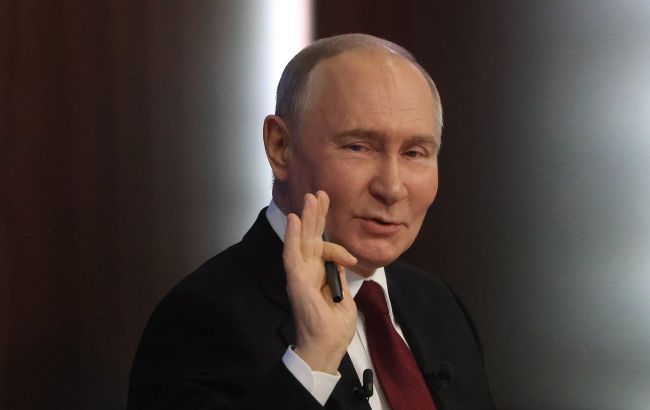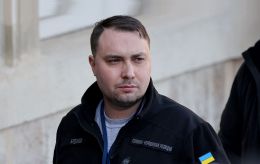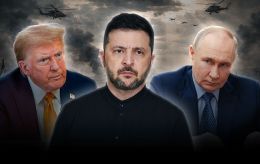Kremlin deliberately drags out negotiations and prepares for prolonged war - ISW
 Russian President Vladimir Putin (photo: Getty Images)
Russian President Vladimir Putin (photo: Getty Images)
Russia continues to threaten escalation of the war and hints at the use of new types of weapons. The Kremlin is preparing to expand the conflict into a prolonged phase without any compromise, reports the Institute for the Study of War (ISW).
Given the nature of the negotiations in Istanbul and the demands voiced by the Russian delegation, analysts from the institute are convinced that Russia’s goal in the war remains the complete capitulation of Ukraine.
At the same time, the report notes that Moscow presents its territorial claims not as a subject for peace negotiations, but as preconditions for the very ceasefire itself.
The ISW is also convinced that the Kremlin is trying to create the appearance of a willingness to engage in dialogue, while simultaneously issuing ultimatums unacceptable to Ukraine, showing no readiness to compromise.
“ISW continues to assess that Putin will continue to refuse to offer compromises until Ukraine and the West are able to alter his theory of victory, which posits that Russia will win a war of attrition through indefinite creeping advances that prevent Ukraine from conducting successful, operationally significant counteroffensive operations,” the analysts believe.
War dragging on
The Institute is also convinced that, given recent statements from the Russian military-political leadership, the Kremlin is deliberately prolonging the negotiation process, showing an unwillingness to engage in genuine talks - both regarding a ceasefire and the conclusion of a final peace agreement.
The Russian opposition outlet Verstka reported that the Kremlin is not even considering a personal meeting between Russian President Vladimir Putin and Ukrainian President Volodymyr Zelenskyy, understanding that the demands put forward by Russia are unacceptable to Kyiv.
Sources close to Putin’s administration claim that Russia has only intensified its efforts to stall the peace process and continues to present unacceptable ultimatums to Ukraine.
According to one source, Moscow’s insistence on conducting negotiations without intermediaries reflects the Kremlin’s attempt to show that it can dictate terms, including demanding that the US limit the influence of Ukraine’s Western partners.
“Russia remains committed to prolonging peace negotiations so as to continue making battlefield advances and to extract additional concessions from the West. Ukraine has continually demonstrated its willingness to compromise and engage in good-faith negotiations in contrast,” the Institute’s report states.
Risk of war escalation
At the same time, experts note Russia’s readiness to continue or even escalate the war against Ukraine if Kyiv and Washington refuse to accept demands for capitulation.
The statement by the head of the Russian Security Council, Dmitry Medvedev, that a failure in negotiations could trigger an even more terrible phase of the war with new weapons and new participants, was described by the Institute as a veiled threat of using nuclear weapons, involving Russia’s allies in the war, or even attacking European countries.
However, according to ISW’s assessment, it is unlikely that the Kremlin will resort to using nuclear weapons or attack NATO member states at this time.
According to the institute, Russia has repeatedly shown that it will not agree to any conditions other than the complete capitulation of Ukraine, and will likely consider any negotiations that do not aim to achieve these goals as failed.
Threats to continue or escalate the war if Russian demands are not met echo the statement by Kremlin aide Vladimir Medinsky on May 16, when he said Russia is ready to fight for as long as necessary. The ISW called this rhetoric part of a so-called reflexive control campaign, aimed at forcing Kyiv and the West to accept Moscow’s demands for Ukraine’s capitulation.
'Denunciation' of the peace agreement
The Institute for the Study of War also noted that Russia continues to deny the legitimacy of the current Ukrainian government, thereby creating conditions to refuse compliance with any future Ukrainian-Russian peace agreement.
The report reminded that on May 17, Kremlin spokesperson Dmitry Peskov stated that it is important for Russia to know exactly who from the Ukrainian government will sign any documents that could result from a future peace agreement.
ISW is convinced that Peskov’s statements are part of an established Kremlin narrative campaign denying the legitimacy of President Volodymyr Zelenskyy and all Ukrainian governments since 2014.
“This rhetorical campaign is part of efforts to set conditions for Russia to withdraw from any future peace agreements at a time of Russia's choosing and to support Russia's repeated demand that Ukraine acquiesce to regime change and the installation of a pro-Russian proxy government,” experts at the Institute believe.
The agency also emphasized that any future peace agreement must include a clear recognition by Russia of the legitimacy of the Ukrainian government and the Constitution of Ukraine.
Negotiations in Istanbul
On May 16, another round of talks took place in Istanbul aimed at ending the war between Ukraine and Russia.
Following the meeting, the Russian side put forward its usual demands for territorial concessions.
The Ukrainian Ministry of Foreign Affairs stated that the Russian delegation presented unacceptable demands that do not align with the country’s interests.
After the negotiations, US President Donald Trump declared that no progress in the peace process will happen without his personal meeting with Putin.
For a more detailed analysis of the Ukraine-Russia negotiations in Istanbul, read our article.

